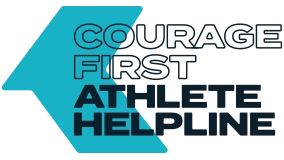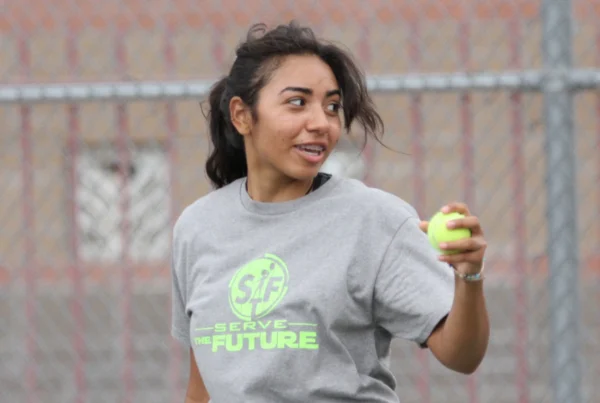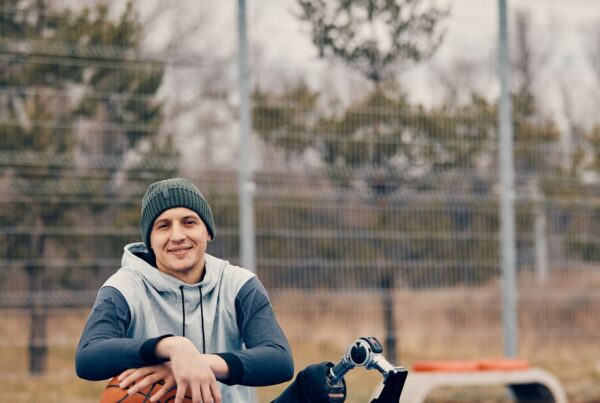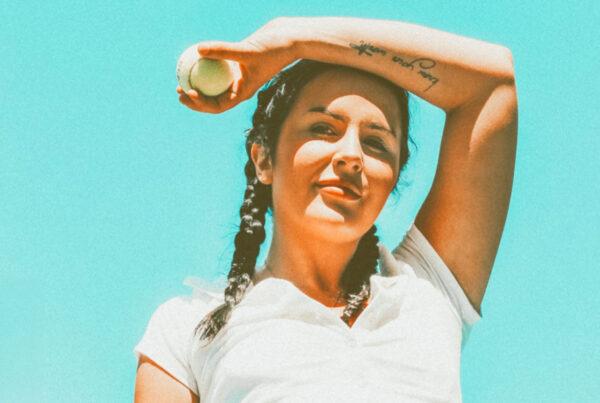In the dynamic world of sports, where athletes push their limits to achieve greatness, a support system is more crucial than ever. Childhelp, in partnership with the Foundation for Global Sports Development/Sidewinder Films intends to make sure the physical and mental safety of athletes is at the forefront.
The Courage First Athlete Helpline, which offers helpline services to athletes and those in and around sports communities, is undergoing something of a transformation lately. At the helm of this change is program manager Catherine Beach. We sat down with Cathy to discuss what these changes mean for those who use the service and share insights into its first two years of service and what’s ahead.
 You were an athlete, right Cathy?
You were an athlete, right Cathy?
Yeah.! I competed and coached in gymnastics and competitive cheer. The team brings a lot of lived experience in sports to inform what we do along with the heart, drive, and expertise to meet the need in this space. We’re passionate about helping athletes and nurturing a sports culture that’s proactive about their safety and success.
Tell me more about the Courage First Athlete Helpline. How is it different from other helplines?
The Courage First Athlete Helpline reaches athletes, former athletes, parents, coaches, and those involved in sports, encouraging mental and physical safety in their communities. This isn’t just a helpline; it’s a cultural shift empowering everyone to protect athletes and allowing young people to make that call.
Anyone needing help can call, text, or chat Monday through Friday from 12 to 8 p.m. Pacific time. Help seekers outside those hours are routed to the 24/7 Childhelp National Child Abuse Hotline, where someone qualified will always answer with help.
The toll-free call/text number is 1-888-279-1026, and the web address for online chat is athletehelpline.org
What a great resource, but it seems like a lot to get off the ground. How did Courage First Athlete Helpline make the leap from ‘good idea’ to a program making a difference in the lives of athletes?
Well, it hasn’t been easy, but we’re seeing great progress.
The project grew out of a 25-year partnership between Childhelp and the Foundation for Global Sports Development/Sidewinder Films, one that had already shaped national prevention awareness initiatives and sports recreation at Childhelp Residential Programs. They do incredible work promoting accessible, fair and abuse-free sport for youth, and their production company, Sidewinder Films, has released truly impactful documentaries like ‘At the Heart of Gold: Inside the USA Gymnastics Scandal.” It’s great to have that kind of support on our side. “Courage First” emerged in 2019 as their abuse prevention initiative for athletes, and that was the main inspiration for the athlete helpline we have now.
We officially launched Courage First Athlete Helpline in the fall of 2022 at GSD’s annual Humanitarian Award Ceremony. That event was hosted by Judge Rosemary Aquilina, who presided over the Dr. Larry Nassar sexual assault trial, and it honored one of our advisory committee members, Jon Vaughn, a former NCAA and NFL football player and sexual abuse survivor.
I bet there was a lot of groundwork to lay before launch. Was there special training for counselors? Outreach to the sport community?
Oh. Definitely.
The implementation team reviewed research and met with subject matter experts from across the field. We formed an advisory committee with coaches, former NCAA and professional athletes, research partners, and sports administrators. We also expanded our helpline database with a focus on resources for athletes and added sports-based modules to the counselor training. Those were created by two leading researchers in sports safeguarding, Dr. Ashley Stirling and Dr. Emma Kavanagh. We sincerely appreciate their time and expertise on this project.
The next challenge was reaching out to athletes and those who work with them. We spread the word at sports conferences and tournaments, in traditional media and online. The helpline has been available for two years and in development before that, but we’re excited to keep getting better at what we do.
Me too! So, in the last two years, have you been getting the kinds of calls you expected? What sort of help seekers make their way to the helpline?
Courage First counselors respond to those needing crisis intervention, emotional support, referrals and resources, and everyone in between. Many help seekers are young people deciding who to talk to or where they should report. Many ask about their own mental health struggles and their relationships with parents. Concerned coaches and parents reach out for advice and resources, too. Adult survivors get in touch.
Concerns from help seekers range across the board – sexually-related hazing, overtraining, concerns about mental health and well-being after an athletic career, and more within all kinds of sports: volleyball, track and field, soccer, dance, etc.
The helpline has been operating for a couple of years. What did you learn during that time?
Research is important in informing our work, and measuring successes allows us to deliver the best service possible to our help-seekers.
Dr. Robin Ortiz of NYU has been working with us to define research questions and build a framework to understand the impact of Courage First, ultimately to publish what we learn to help others.
Research is at the heart of our work, and measuring successes informs each new challenge.
Talking with athletes, coaches, parents, and administrators along the way, we’ve been able to partner with and engage a huge number of schools, organizations and associations that work close to us in helping athletes, and the need for this service has been continuously affirmed by so many of them.
As we continue outreach, it’s also clear that for all the research, training, and effort to establish and staff a world-class athlete helpline, it will take even more to reach out to the young athletes who need help.
That’s a lot to learn in a very short time. Has the program made many changes to reflect what you know now versus what you knew at launch?
We like to think that this isn’t just a program … we’re helping to promote an entire culture shift.
Even before the helpline launched, Courage First took its inspiration from some of the high-profile cases of survivors who refused to let abuse define their future. As we broaden our outreach, we want to inspire and reflect a sports culture that honors athletes, so we’re honing our message to the audience that relies on us the most.
We like to think that this isn’t just a program … we’re helping to promote an entire a culture shift!
The help seekers we’ve heard from have mostly been ages 13 to 24. So, we’re refreshing our look and messaging to speak to them more directly. Along with a more easily-navigable and approachable look online, we’re adding a blog to our site to keep followers better informed, but our helpline services will still reflect the expertise and special training that makes Courage First Athlete Helpline so unique.
This is still a new program, and it sounds like there is a lot to look forward to, what else can supporters and friends expect in the next few months?
For now, they can expect expanding outreach, engaging the community, and providing top-tier helpline services. If there’s one thing to learn from being an athlete, it’s that reaching goals takes time, and help from others. But we’ll get there.
We hope to expand funding in the coming months, so there’s been a concerted new effort in applying for additional grants. Once we’ve launched the updated website, we’ll be able to accept donations in new ways too, to continue providing the helpline service at no cost to help seekers.
In growth, it’s a careful balance between getting people to our helpline and ensuring we have the counselors we need to listen, especially with the goal of operating 24/7 in the future
Right now, we’re open throughout the week, Monday through Friday, from 12pm-8pm PST, but can take calls outside operating hours that roll over to the Childhelp National Child Abuse Hotline. When this happens, Childhelp’s main hotline counselors can see the call coming in from the Courage First line. They can address the contact if it requires immediate response, or they can suggest the help-seeker speak to an athlete-specific counselor during working hours.




